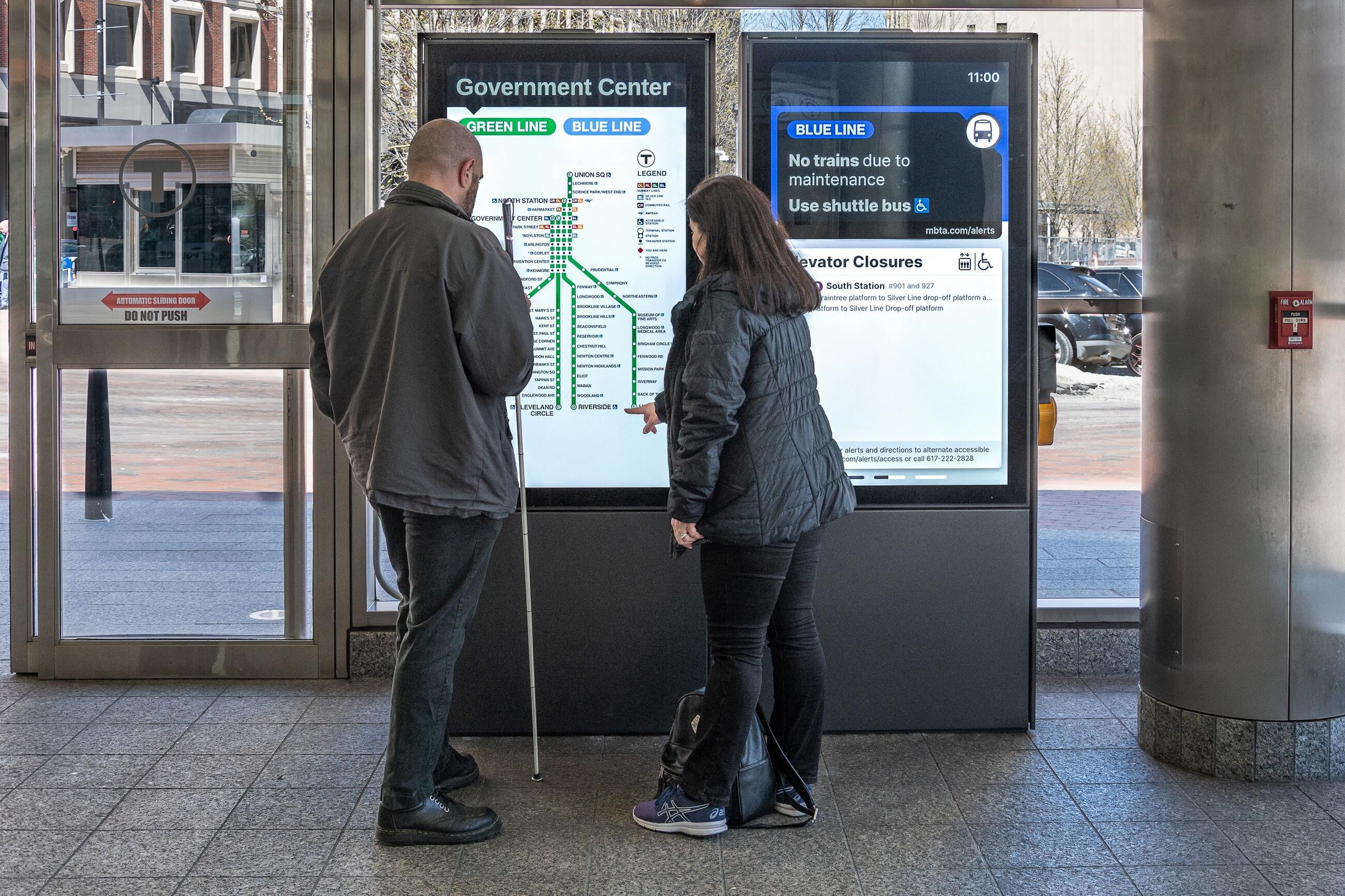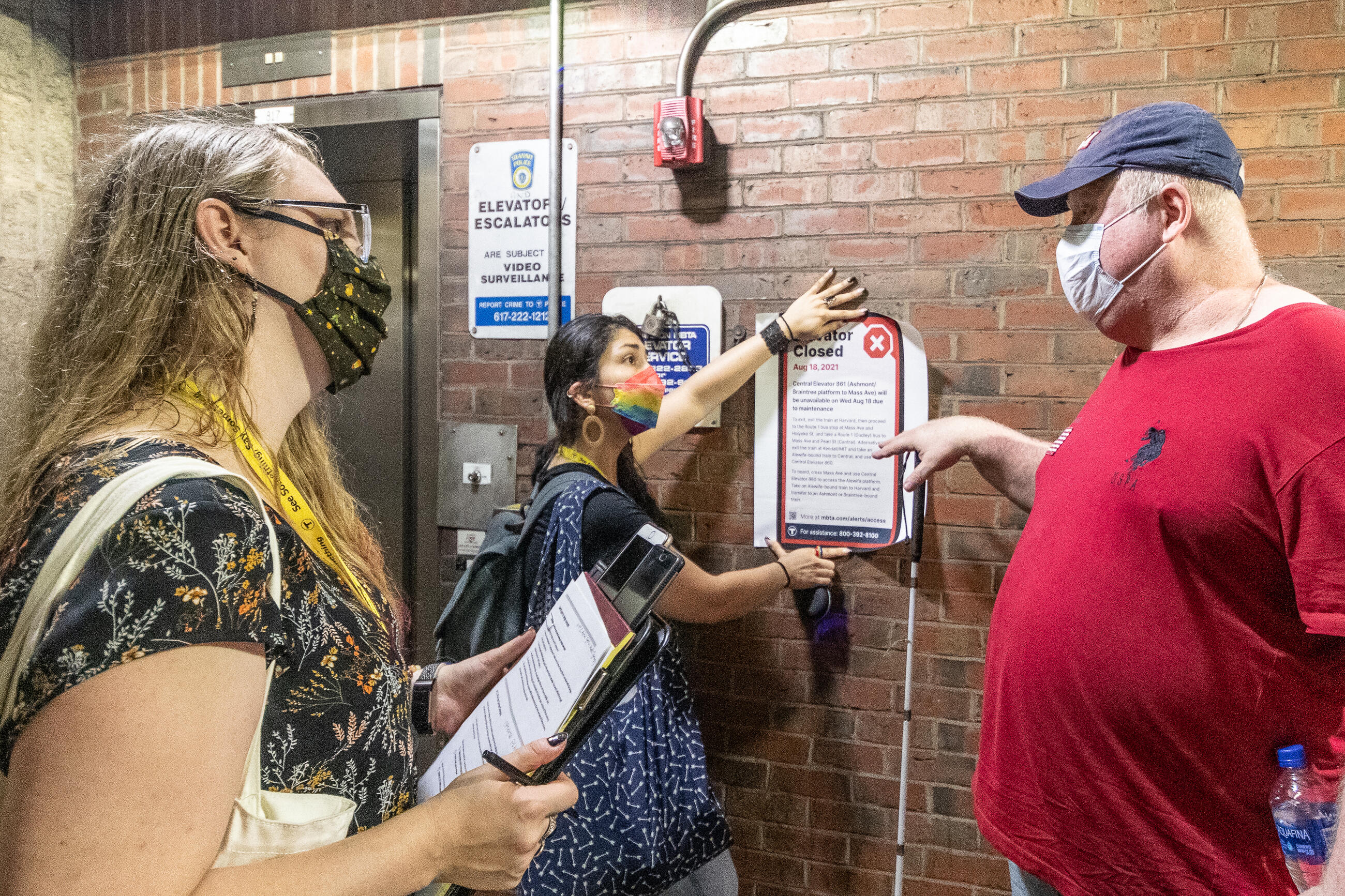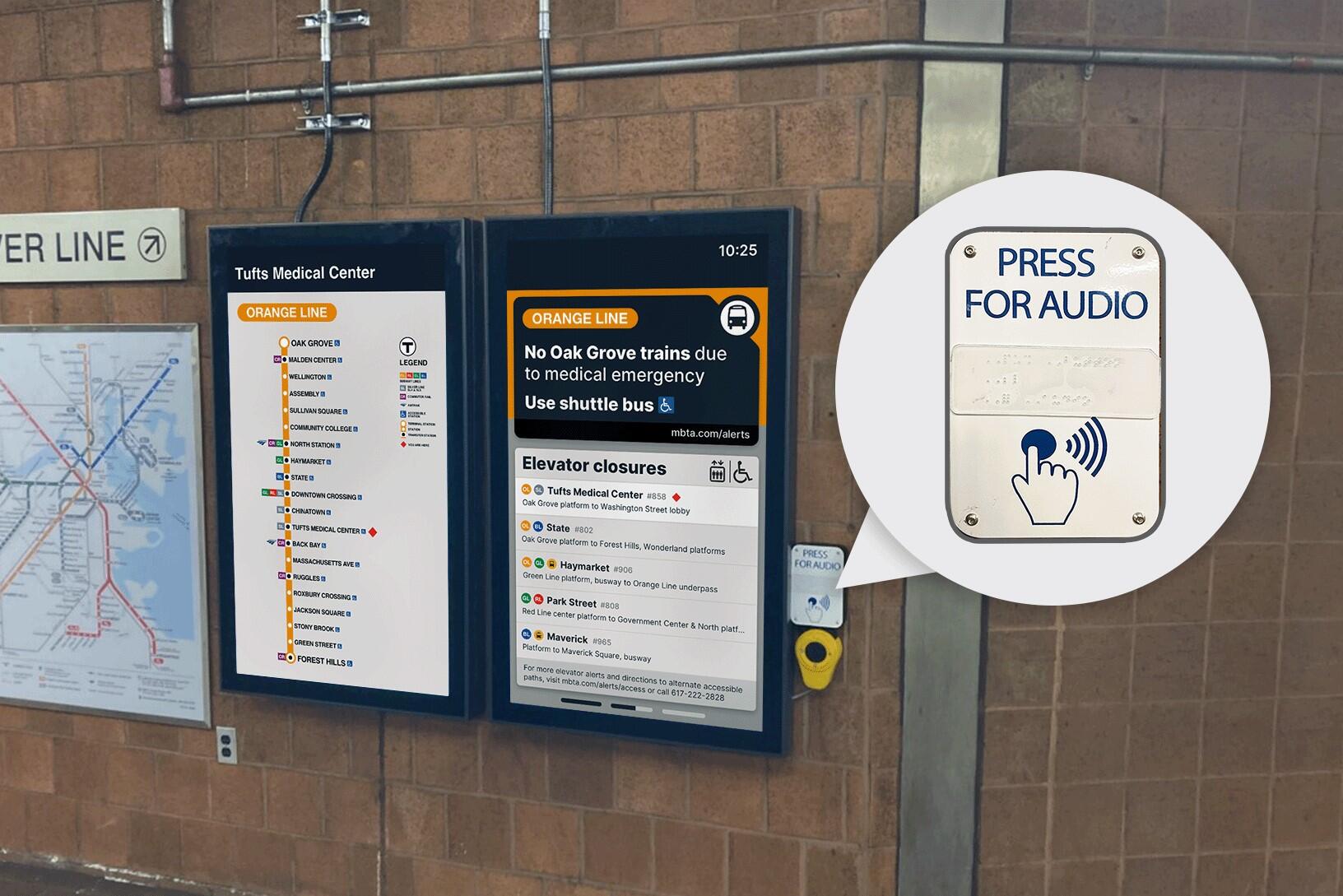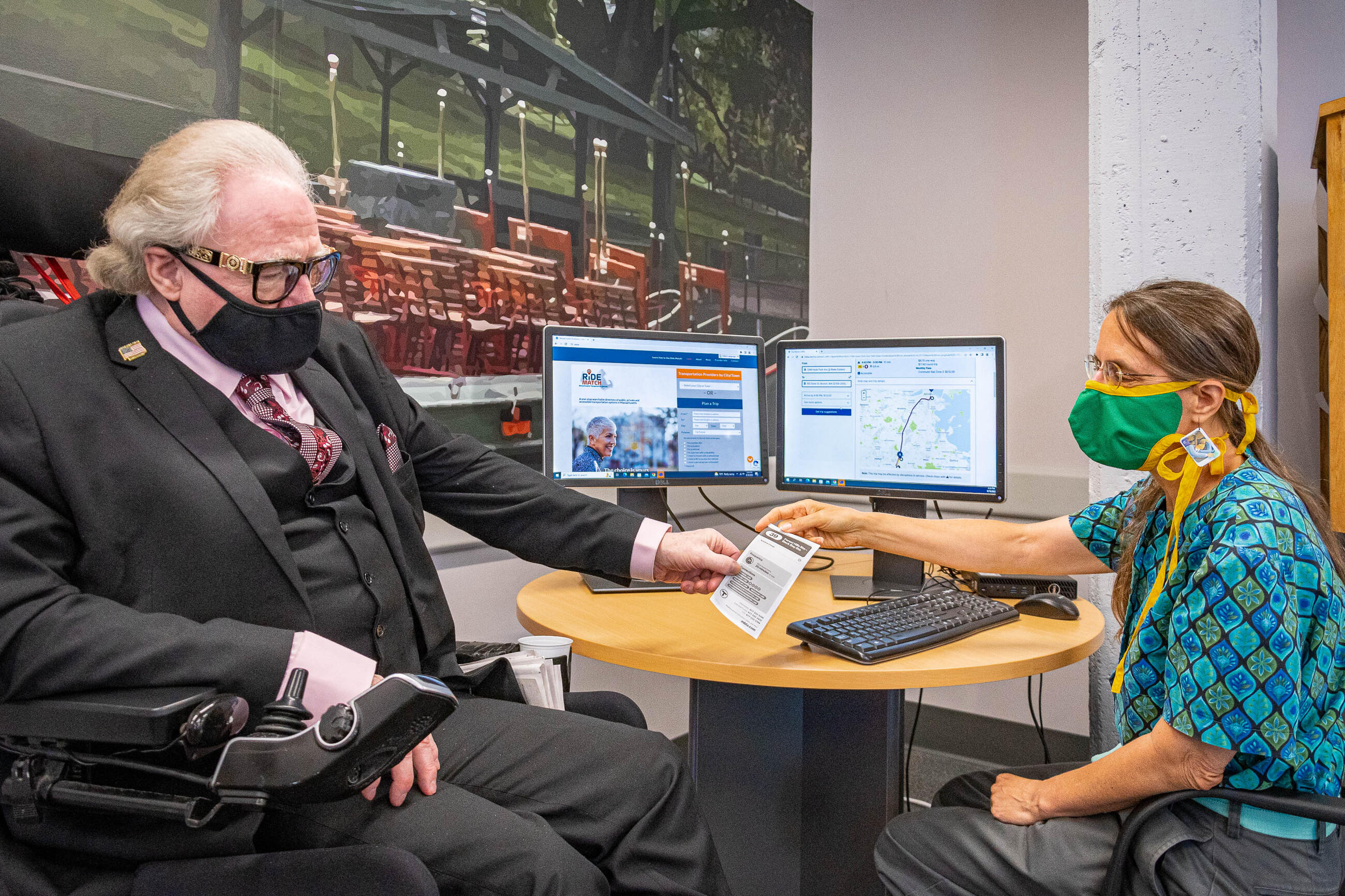Accessible Technology

In 2019, the MBTA Department of System-Wide Accessibility (SWA) and the Technology Innovation Department (TID) partnered to create a program focused on finding and developing technology to improve our system’s accessibility. We work on new tools and explore ways to harness technology so that riders with disabilities have better, more accessible journeys on the T.
We Want to Hear from You
We invite you to give us your suggestions, questions, or complaints about accessible technology. Please contact MBTA Customer Support, let us know if your comments are related to accessibility, and provide as many details as possible so we can give the most helpful response.
Phone
Voice: 617-222-3200
711 for TTY callers; VRS for ASL callers
Identifying Problems and Solutions

Our first step is to identify existing problems by turning to our greatest resource—our riders. When we listen to comments at public meetings, hold focus groups, or go with riders on ride-alongs during their daily commutes, our first goal is to understand the problems faced by riders with disabilities before we explore accessible solutions.
Here are some of the problems you’ve helped us identify, and a few of the solutions we’ve developed.
Completed Projects
Some of our accessible technology projects are now permanent at the MBTA. Other pilot projects are no longer active but continue to inform our research on accessible solutions for riders.
Accessible Applications for Reduced Fares
In 2022, we brought reduced fare applications online. Approximately 50,000 eligible MBTA riders with disabilities, older adults, and people with low income have since had access to online applications for all free or reduced fare programs.
Learn more about reduced fares
Offline Information for Elevator Outages
The MBTA has an elevator and escalator hotline that riders can call to hear recordings of accessibility-related outages that may impact their travel. Anyone with a telephone can call in, ensuring that riders without Internet access can make informed decisions about their travel.
TID automated this hotline to provide realtime, automatic updates. Previously, outage messages were manually recorded every two hours. Automation resulted in:
- Improved hotline audio quality
- More timely outage information
- Less work for the Operations team
You can call the hotline at 617-222-2828 to learn about elevator and escalator outages.
Urine Detection in Elevators
From October 2022 to January 2023, we tested the effectiveness of urine detection sensors in four MBTA elevators. A sensor would send a message to station ambassadors to check the elevator for urine, so a cleaning crew could be quickly dispatched.
We found that real-world conditions often caused the sensors to be inaccurate. As a result, we haven't continued using the sensors as one of our elevator cleanliness methods.
Current Projects

Several projects are currently underway at the MBTA, with pilot programs in active development.
Realtime Information for Elevator Outages
Currently, we communicate elevator outages and alternate travel routes using our T-Alerts system, and on paper notices posted in affected stations' lobbies and near affected elevators. However, these methods aren't always enough to help riders avoid unexpected travel disruptions.
We're piloting digital signs to inform riders of elevator problems:
- Pre-fare screens, installed in station lobbies, have been in use in several subway stations since 2022
- Elevator screens, posted on walls near elevators, will be piloted at Forest Hills starting in early 2025
The digital signs display real-time information about elevator outages and key alternate route information. Their accessible features include ADA-compliant font sizes, high-contrast text, and push buttons with braille for audio equivalence.
Realtime Visual and Audio Information
Since 2019, the MBTA has implemented accessibility features on new and existing digital signs at stations and bus stops, and on vehicles. These provide realtime arrival information and service alerts visually and, sometimes, audibly:
- Solar-powered E Ink signs at Green Line stations and some bus stops have push buttons with braille to provide audio equivalence—audible versions of written signs
- Newer Green Line vehicles have updated digital signs with ADA-compliant text that is two inches high or larger
- All Orange Line and newer Red Line vehicles have updated digital signs with larger text and higher contrast
- All Orange Line and newer Red Line vehicles have an updated door locator tone
- Two digital signs at Maverick and Roxbury Crossing provide audible versions of written signs that riders can listen to via a headphone jack
Learn more about digital signage
Audio and Visual Equivalence Policy
All riders deserve an equitable experience with digital signage, so TID and SWA collaborated to create and maintain an audio and visual equivalence policy. The policy aims to ensure that digital signs provide real-time information in both audio and visual formats, so that:
- Riders who are blind or have low vision have an equitable experience when information is available on digital signs
- Riders who are deaf or hard of hearing have an equitable experience when information is available primarily via audio announcements
Download the audio and visual equivalence policy (PDF, 618 KB)
Accessible Wayfinding Technology
Providing accessible wayfinding to riders who are blind or have low vision can be a challenge in environments where GPS doesn't work or isn't accurate enough.
In early 2025, we'll pilot a mobile app called NaviLens to help riders who are blind or low vision navigate MBTA bus stops, busways, or subway stations with more confidence and independence.
NaviLens helps users navigate a location through audible voice instruction, 3D sound, and haptic technology. It can help riders locate a bus stop or areas in a station such as entrances and exits, fare gates, and platforms.
The pilot will be conducted at:
- Kenmore station and busway
- North Station
- Two bus stops on Route 57
We'll conduct usability testing with riders who are blind or have low vision to determine the pilot's effectiveness. If riders find NaviLens helpful for wayfinding, we may expand our use of the app to other MBTA stops or stations.
The Mobility Center Can Help You Choose How to Ride

The Mobility Center, located in Boston at 1000 Massachusetts Ave, can help you plan trips, apply for reduced fare passes, sign up for The RIDE, and more.
Past Research
We’re always learning from our efforts, whether we're deploying a pilot or collaborating with other organizations. Below are some of our recent research efforts:
- Analyzed barriers to access at bus stops—this led Google Maps to make Boston one of the first cities included in their new wheelchair-accessible trip-planning feature
- Conducted research on vehicles' door locator tones with riders who are blind or have low vision
- Explored the use of ultra-wideband (UWB) radio technology to help riders who are blind or have low vision with wayfinding
- Piloted a visual interpretation service to connect riders who are blind or have low vision with highly trained agents who provide realtime information about riders' surroundings
- Analyzed barriers to access when riders use station call boxes to call for help
- Interviewed an orientation and mobility (O&M) specialist
- Conducted 13 interviews and went on four ride-alongs with riders who are blind or have low vision
- Interviewed six riders who depend on elevators
- Formed a focus group with over 15 riders who are blind or have low vision
- Held five app-testing sessions
- Collected informal feedback and input from dozens of riders
Related Projects
Related Projects
We Want to Hear from You
We invite you to give us your suggestions, questions, or complaints about accessible technology. Please contact MBTA Customer Support, let us know if your comments are related to accessibility, and provide as many details as possible so we can give the most helpful response.
Phone
Voice: 617-222-3200
711 for TTY callers; VRS for ASL callers
The Mobility Center Can Help You Choose How to Ride

The Mobility Center, located in Boston at 1000 Massachusetts Ave, can help you plan trips, apply for reduced fare passes, sign up for The RIDE, and more.

